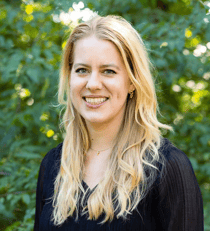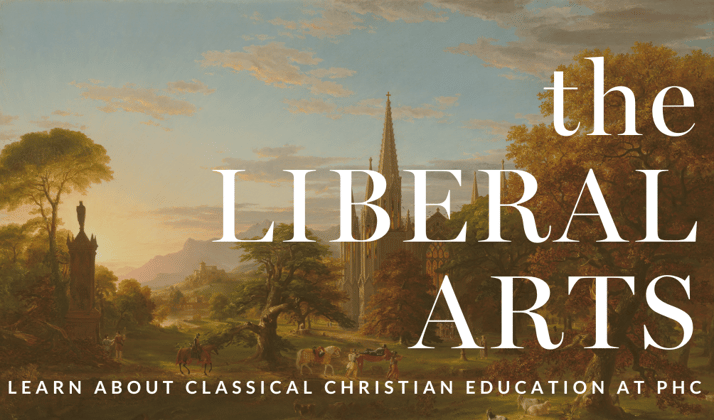.gif?width=714&height=357&name=Blog%20Banners%20(14).gif)
PHC alumna Katherine Kramer (CLA, ‘10) founded Alexandria Classical Christian Academy in Alexandria, Virginia, this past fall. Four of the teachers—over half the faculty—are also PHC alumni. PHC’s former pedagogy program inspired Kramer to pursue classical education. “What they did for me and others through the program was magical,” she said.
Kramer credits the former pedagogical professors Dr. Gene Edward Veith and Drs. Steven and Laura McCollum for inspiring her. After taking Pedagogy I, she switched from majoring in Literature to majoring in CLA with an emphasis on education and a minor in Literature. “It was incredibly formative to read the trajectory of educational philosophy in the West,” she said. 
PHC's core class Freedom’s Foundations also impacted Kramer. “[Freedom’s Foundations] helps you think broadly about the way society is governed and helps you ask big-picture questions,” she said. She appreciated the broad approach of studying the wisest way to structure something, whether that be a government, a school, or a classroom.
After graduating in 2010, Kramer worked at Immanuel Lutheran School, where she loved teaching both Lower School and Upper School. “As a teacher, you have a front-row seat to watch the Lord transforming people,” she said. She credits her love of teaching to the teachers at PHC. Kramer became assistant headmaster to this classical school in 2016.
During COVID-19, Kramer witnessed the need for classical Christian schools as she saw families looking for private, in-person schools. After she had the idea to start her own school, logistics began falling into place. A church offered to lease space. A lawyer offered to help her with paperwork. “It feels a little insane to be doing this, but it isn't. It's a leap of faith," she said. "It's clear to me through His provision that God is providing a way for this school."
In ACCA’s opening semester, the school served 30 students, ranging from preschool to 4th grade. The school plans to add a new grade each year.
One of Kramer’s goals for ACCA is to focus on craftsmanship. “Craftsmanship is important because it helps us serve our students well and preserve us,” she said. This means allowing teachers who create curricula for the school to own that intellectual property and have the freedom to sell that curriculum to other schools. “It will help bring in teachers that want to create good things … and bless classical Christian education in the country,” she said.
The curriculum at ACCA is linear, challenging, and directed to truth. “Classical education is about bringing students to the True, Good, and Beautiful—what is best—because it is ultimately realized in Jesus Christ,” Kramer said.
 ACCA covers the first stage of classical education: Grammar. “For students in primary school, classical education is a captivating way to learn, because it works with the grain of child development,” Kramer said. Teachers for this age group focus on filling their students’ minds with knowledge. As students grow up, they learn about reasoning (Logic), then combine their knowledge and reasoning with good communication (Rhetoric).
ACCA covers the first stage of classical education: Grammar. “For students in primary school, classical education is a captivating way to learn, because it works with the grain of child development,” Kramer said. Teachers for this age group focus on filling their students’ minds with knowledge. As students grow up, they learn about reasoning (Logic), then combine their knowledge and reasoning with good communication (Rhetoric).
“It’s all new and exciting to them,” PHC alumna and ACCA 2nd-grade teacher Carissa Davis said. Her students love songs, which they use to memorize facts, and they love stories, not differentiating in their minds between literature and history. Davis said the goal at this stage is to inspire love and imagination about what they learn. 
Davis graduated from PHC in 2013 with a degree in CLA with an emphasis on literature. After graduating from PHC, Davis taught English in South Korea for two years to kids ranging from kindergarten to sixth grade. Back in Virginia, she taught middle school English at Immanuel Lutheran School and became a lead Upper School teacher, helping write the literature curriculum. She worked there for eight years before joining ACCA this fall.
PHC first exposed Davis to classical education by that name, even though her homeschool curriculum included elements of a classical education. “The whole education I got at Patrick Henry was wonderful—the discussions with the teachers carried over to discussions with classmates in the cafeteria [and] in the dorms,” she said. She also explained how the relationships she had with PHC professors shaped the goal of relational learning at ACCA. “They had relationships with all of us and they knew us, and so much of the learning was built on the trust of the relationship with them.”
The pedagogy classes at PHC helped clarify for Davis how classical education differs from modern progressive education. Progressive education aims to make good citizens who make money in this modern world, but classical education is concerned with the type of person someone is becoming.
“We want to train students to become people who think intentionally about what they’re doing. Whatever actual money-making job they have as adults is only part of the person they are becoming," Davis said.
--
Patrick Henry College exists to glorify God by challenging the status quo in higher education, lifting high both faith and reason within a rigorous academic environment; thereby preserving for posterity the ideals behind the "noble experiment in ordered liberty" that is the foundation of America.

.png?width=800&height=400&name=PHC%20(1).png)


